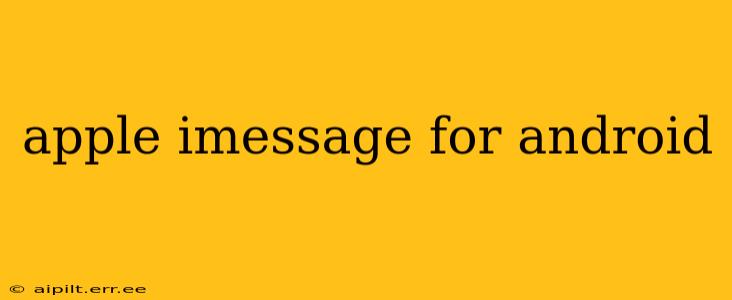The question of whether Apple will ever release iMessage for Android is a perennial favorite among tech enthusiasts. While Apple hasn't officially announced plans for cross-platform compatibility, the desire for it remains strong. This article delves into the complexities surrounding this topic, exploring the technical challenges, potential benefits, and the ongoing debate about its feasibility.
Why Don't I Have iMessage on My Android?
This is the core question fueling much of the discussion. The short answer is: Apple hasn't made iMessage available for Android. While technically feasible, several factors contribute to Apple's continued reluctance. These include:
-
Ecosystem Lock-in: A primary reason for Apple's hesitance is the powerful incentive to keep users within its ecosystem. iMessage is a significant draw for iPhone users, and offering it on Android might weaken that loyalty. The seamless integration with other Apple services and devices strengthens this lock-in.
-
Technical Challenges (Though Diminishing): Integrating iMessage with Android requires significant engineering effort. The underlying protocols and functionalities would need to be adapted to work across different operating systems, potentially impacting performance and stability for both platforms. However, advancements in cross-platform communication technologies have significantly reduced these hurdles.
-
Apple's Strategic Decision: Ultimately, the decision rests with Apple's leadership. The perceived risks of losing its competitive edge might outweigh the potential benefits of wider iMessage adoption.
What Are the Advantages of Having iMessage on Android?
Imagine a world where seamless text messaging transcends operating systems. The advantages are numerous:
-
Improved Communication: The most obvious benefit is the ease of communication between iPhone and Android users. No more switching between different messaging apps, dealing with varying image qualities, or worrying about read receipts.
-
Enhanced User Experience: A unified messaging experience would be far more convenient, eliminating the fragmentation and inconsistencies currently present.
-
Increased Inclusivity: By breaking down the barrier between iOS and Android, Apple would significantly improve communication accessibility for a vast number of users.
Could Apple Ever Release iMessage for Android?
While there's no official announcement, the possibility remains. Several factors could influence Apple's decision:
-
Competitive Pressure: Increasing competition from other messaging platforms might force Apple to reconsider its strategy. The need to maintain market share could lead to a more open approach.
-
Market Demands: Growing public pressure and demand for cross-platform compatibility could push Apple to act.
-
Technological Advancements: Continued improvements in cross-platform communication technologies could simplify integration and potentially minimize risks.
What Alternatives Exist to iMessage for Android Users?
While a native iMessage app remains elusive, several alternatives can facilitate communication between iOS and Android:
-
WhatsApp: A widely used, cross-platform messaging app offering end-to-end encryption.
-
Signal: Another popular option emphasizing privacy and security.
-
Google Messages: Google's default messaging app offers RCS (Rich Communication Services), which provides features similar to iMessage, but with compatibility across Android devices.
What Are the Technical Challenges in Developing iMessage for Android?
The technical hurdles involved in porting iMessage to Android are considerable, but not insurmountable:
-
Protocol Differences: iOS and Android utilize different underlying communication protocols, requiring extensive adaptation and bridging.
-
App Integration: Seamless integration with other Apple services and functionalities needs careful planning and execution.
-
Security Considerations: Maintaining the security and privacy features of iMessage while operating on a different platform demands robust security measures.
Will Apple's iMessage Ever Work on Android?
This remains a question only Apple can definitively answer. The possibility exists, but the decision depends on various factors, including market dynamics, technological feasibility, and Apple's broader strategic goals. The absence of an official announcement doesn't preclude future developments, and the continued discussion surrounding the topic underscores the significant demand for cross-platform compatibility. For now, users must rely on alternative messaging apps to maintain seamless communication across different operating systems.
